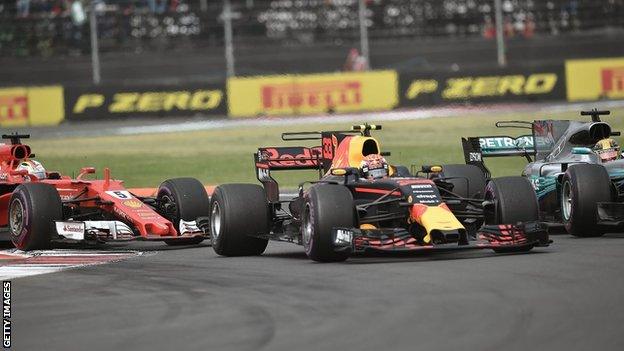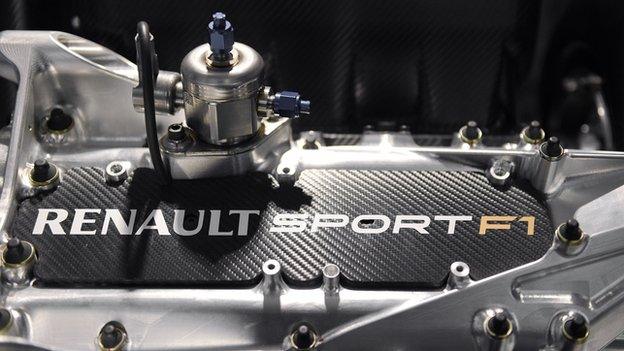Formula 1: New engine formula from 2021 announced
- Published

Fifteen of the 19 Formula 1 races in 2017 so far have been won by Lewis Hamilton (right), Max Verstappen (centre) or Sebastian Vettel
Formula 1 has revealed its plans for a new engine formula from 2021.
The proposals are aimed at reducing costs, "improving the sound", increasing competitiveness between teams and maintaining road relevance.
The plan is to retain a 1.6-litre V6 turbo hybrid but to remove one of the two ways currently used to generate hybrid power.
Engines will run at a higher speed and the drivers will have greater control over hybrid energy deployment.
The key proposals, which are an attempt to improve the racing, were presented to teams by governing body the FIA and new F1 owners Liberty Media at a meeting in Paris on Tuesday.
The proposals are:
a 1.6-litre V6 turbo hybrid.
Engines running 3,000rpm faster to improve sound.
The removal of the MGU-H, the part of the hybrid system that recovers energy from the turbo and which is largely responsible for muting the sound made by the current engines.
A more powerful MGU-K - which recovers energy from the rear axle - to make up the loss in hybrid energy from the MGU-H and with the option for a driver to save up energy over a number of laps to add a tactical element to the racing.
A single turbo with constraints on dimensions and weight.
Standard battery and control electronics.
Research into tightening up fuel regulations
It is hoped the new formula will enable smaller, private engine companies to enter F1 and compete with the manufacturers and attract other car companies into the sport.
The move follows months of work by the FIA and F1 Group, which was taken over by US group Liberty Media, and is recognition that the current engine has significant flaws.
It has produced engines that have created a revolution in terms of efficiency but they have failed to excite fans, partly because of their limited noise, and the smaller teams feel they are too expensive.
A joint statement by the FIA and F1 said the proposals would now be "discussed and developed" by interested parties in a series of meetings "in the spirit of the widest possible co-operation".
However, if the FIA and F1 are in agreement, the teams do not have enough power within F1's rule-making procedure to block them - unless Ferrari objects and decides to use a veto over new rules it has enshrined in its contracts with the sport.
Ross Brawn, F1 managing director motorsports, emphasised the proposals had arisen from "a series of meetings with the F1 teams and the manufacturers who showed their interest to be part of the pinnacle of motor sport".
He added: "We've carefully listened to what the fans think about the current (engine) and what they would like to see in the near future with the objective to define a set of regulations which will provide a powertrain that is simpler, cheaper and noisier and will create the conditions to facilitate new manufacturers to enter Formula 1 as powertrain suppliers and to reach a more levelled field in the sport.
"The new F1 has the target to be the world's leading global sports competition married to state of the art technology. To excite, engage, and awe fans of all ages but to do so in a sustainable manner. We believe that the future power unit will achieve this."
- Published4 February 2016

- Published31 October 2017

- Published30 October 2017